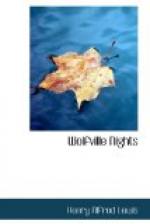“Black Feather used to cross over to where Dick Stocton maintains a store an’ licker house on the Upper Hawgthief. Of course, no gent sells these Injuns licker. It’s ag’in the law; an’ onless you-all is onusual eager to make a trip to Fort Smith with a marshal ridin’ herd on you doorin’ said visit, impartin’ of nosepaint to aborigines is a good thing not to do. But Black Feather, he’d come over to Dick Stocton’s an’ linger ‘round the bar’ls of Valley Tan, an’ take a chance on stealin’ a snifter or two while Stocton’s busy.
“At last Stocton gets tired an’ allows he’ll lay for Black Feather. This yere Stocton is a mighty reckless sport; he ain’t carin’ much whatever he does do; he hates Injuns an’ shot guns, an’ loves licker, seven-up, an’ sin in any form; them’s Stocton’s prime characteristics. An’ he gets mighty weary of the whiskey-thievin’ Black Feather, an’ lays for him.
“One evenin’ this aggravatin’ Black Feather crosses over an’ takes to ha’ntin’ about Dick Stocton’s licker room as is his wont. It looks like Black Feather has already been buyin’ whiskey of one of them boot-laig parties who takes every chance an’ goes among the Injuns an’ sells ’em nosepaint on the sly. ’Fore ever he shows up on the Upper Hawgthief that time, this Black Feather gets nosepaint some’ers an’ puts a whole quart of it away in the shade; an’ he shore exhibits symptoms. Which for one thing he feels about four stories tall!
“Stocton sets a trap for Black Feather. He fills up the tin cup into which he draws that Valley Tan with coal-oil—karoseen you-all calls it—an’ leaves it, temptin’ like, settin’ on top a whiskey bar’l. Shore! it’s the first thing Black Feather notes. He sees his chance an’ grabs an’ downs the karoseen; an’ Stocton sort o’ startin’ for him, this Black Feather gulps her down plump swift. The next second he cuts loose the yell of that year, burns up about ten acres of land, and starts for Red River. No, I don’t know whether the karoseen hurts him none or not; but he certainly goes squatterin’ across the old Red River like a wounded wild-duck, an’ he never does come back no more.
“But, son, as you sees, I don’t know nothin’ speshul or much touchin’ Injuns, an’ if I’m to dodge the disgrace of ramblin’ along in this desultory way, I might better shift to a tale I hears Sioux Sam relate to Doc Peets one time in the Red Light. This Sam is a Sioux, an a mighty decent buck, considerin’ he’s Injun; Sam is servin’ the Great Father as a scout with the diag’nal-coat, darby-hat sharp I mentions. Peets gives this saddle-tinted longhorn a 4-bit piece, an’ he tells this yarn. It sounds plenty childish; but you oughter b’ar in mind that savages, mental, ain’t no bigger nor older than ten year old young-ones among the palefaces.
“‘This is the story my mother tells me,’ says Sioux Sam, ’to show me the evils of cur’osity. “The Great Sperit allows to every one the right to ask only so many questions,” says my mother, “an’ when they ask one more than is their right, they die.”




